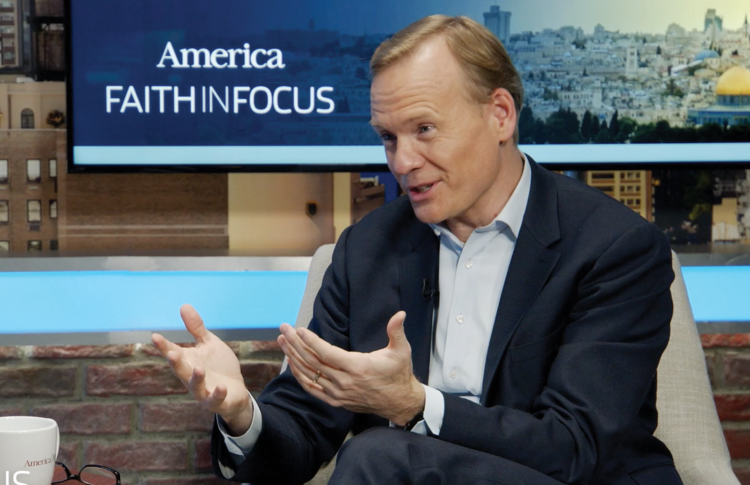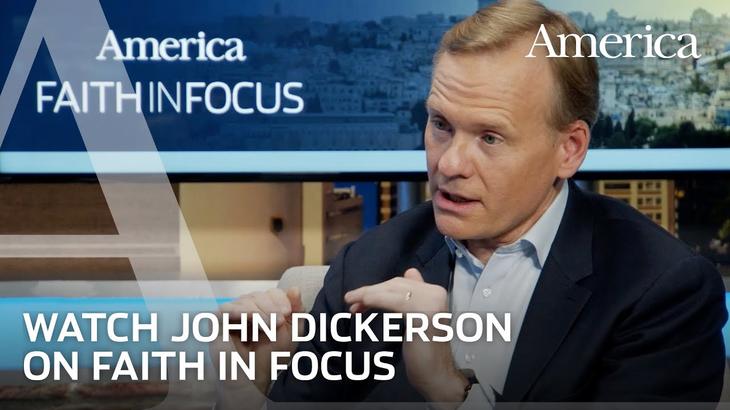Editors’ note: John Dickerson is a veteran journalist of U.S. politics, the host of “CBS This Morning” and a lifelong Catholic. On a recent episode of “Faith in Focus with Fr. James Martin, S.J.,” produced by America Media, Mr. Dickerson spoke with Father Martin about his favorite ways to pray, the importance of humility in journalism and how he hopes to pass on the gift of faith. This text has been edited for clarity.
Has your journalism career deepened your spiritual life or changed it in any way?
I recently had the opportunity to be in Charlottesville, speaking with some residents in public housing.... It was great for me because it is the kind of interview I do not get to do very much anymore, which is talking to real people at length in a more easy atmosphere. And what you are reminded of is our common humanity, which gets squeezed out in the political conversation and, particularly, on social media.
Also, being a journalist now, particularly one in the public realm, is the best check on your humility. Because a lot of times on Twitter and social media you get attacked. And if you try to understand why you are having a strong reaction to those unfair attacks, the answer is often pride. My really strong reaction to attacks is usually a reminder that—even if what they are saying is wrong—I need to recalibrate where I am in terms of how proud I am about what it is that I do.
My faith orders my life. It helps me a lot. And I want to show my kids that because I want to give that gift to them.
You have talked about Mass before as something that grounds you and keeps you humble. How does that happen?
It is a very intimate space for me: Here I am; all the artifice has gone away. Here are my problems. Here are the things I am grateful for. Here are the people I am praying for. Here are the parts of our world that I would like to pray for. The person at Mass is as close to whoever I am as I am—and I am also trying to figure out who that person is. That sometimes happens in church. It happens in prayer.
It sounds like you are bringing what Thomas Merton would call your true self to Mass but also feeling God inviting you to become more of your true self.
Before I started at “CBS This Morning,” I used to have an actual regimen that I quite liked. I would usually read a chapter of Merton’s New Seeds of Contemplation, and then I would write afterward. In the morning, thoughts come more clearly to me than they do later in the day. And so it was this very special time for me to be more meditative about ideas. Writing is the way I understand anything or wrestle with things. I try to fix it on the page and think: That is what I believe.
What have your children taught you about your faith?
First of all, I am glad they are asking questions about faith because it means they want to know. That is basically what my kids have done for me in a whole host of things. Why do you believe what you believe? Why do you treat people the way you do? Why should a person do the right thing when nobody is watching?
All journalists should be humble because we are so often wrong.
And I have tried to come at their questions in various ways. I have told them something like: “Even if you decided not to be religious, it turns out this is a great way to live your life. Even if you don’t sign up for the whole Catholicism thing, live gratefully, humbly, caring about other people. Just read the Beatitudes, kids, and then we’ll talk.”
My faith orders my life. It helps me a lot. And I want to show my kids that because I want to give that gift to them. It was a gift that my parents, that my mother, in particular, gave me through God. So I want to give them that same gift.
You have talked about how your work influences your spirituality. Do you find that you bring your spirituality into your work?
All journalists should be humble because we are so often wrong. Einstein had a really good record of being right about a lot of things. But he was really wrong about huge chunks, and I am no Einstein. But the point is that in scientific inquiry, you have a theory, and you test it, you test it, you test it. And when you are proved wrong, it is not, “Oh, you idiot.” It is: “Oh, that’s wrong. Now we go over here.” You want to be as humble as possible because then you do not miss the chance to discover something new.
In terms of journalism, both in the way you treat people but also the way you just look at things, you want to be humble and make sure you are not bringing your own hot take to something—that you are evaluating things on the merits and in the moment.
And I have disordered affections in the personal realm and in the news realm. I have covered a lot of campaign politics and the chase and the drama of American politics. And that is really important, but we need to recalibrate the kinds of stories we cover because there are big, longterm problems that are affecting lots of people that do not get the kind of coverage they need to and do not get addressed in the public sphere the way they need to. And my faith pulls me to try to be better at that.
Do you feel called to be an advocate for the poor on television?
The word advocate is a little tricky because the job of a reporter is to be neutral. It can also be an impediment to understanding for people if they feel like I am being an advocate because this issue is so politicized. Being interested in the conditions of the poor—on health care, for example—people watching or reading that can think: “Oh, well he’s for single-payer. He’s for public health care for everybody.”
That can be an impediment to learning about the underlying issues. How many people are living in conditions of poverty? Why are they there? Is it getting better? Is it getting worse? I think that is an important story—separate and apart from my faith. It is one of the reasons I go to Mass and pray—to be reminded, because you can cruise through several news cycles before you are reminded of what actually we should be paying a little bit more attention to.












How true? Especially today. But more harmful is the bias.